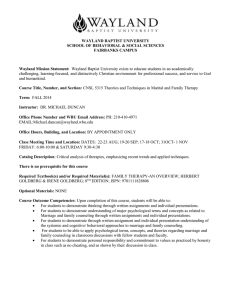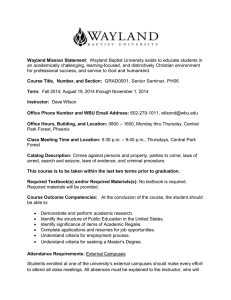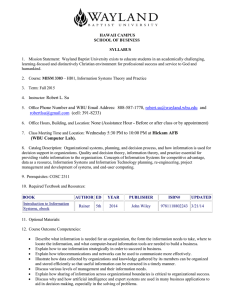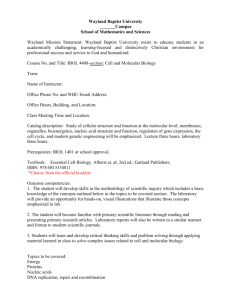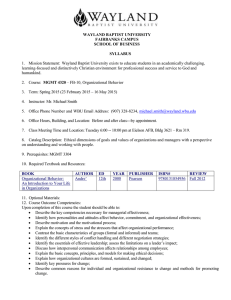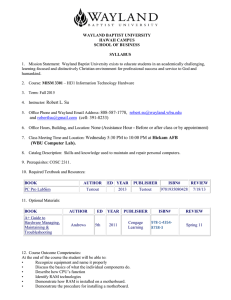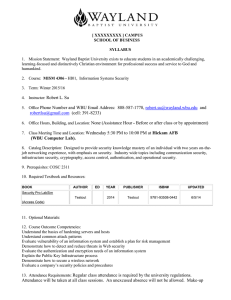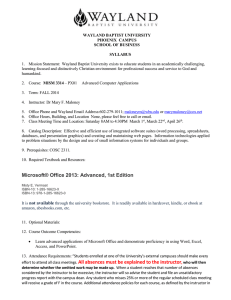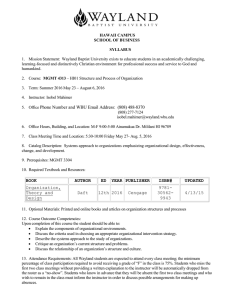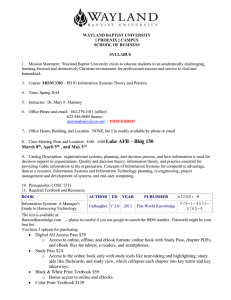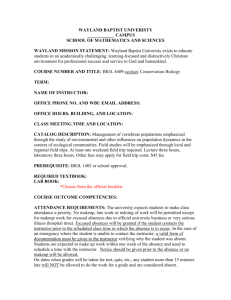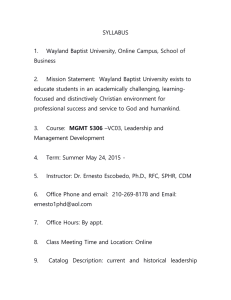WAYLAND BAPTIST UNIVERSITY SCHOOL OF BEHAVIORAL & SOCIAL SCIENCES Phoenix Campus
advertisement
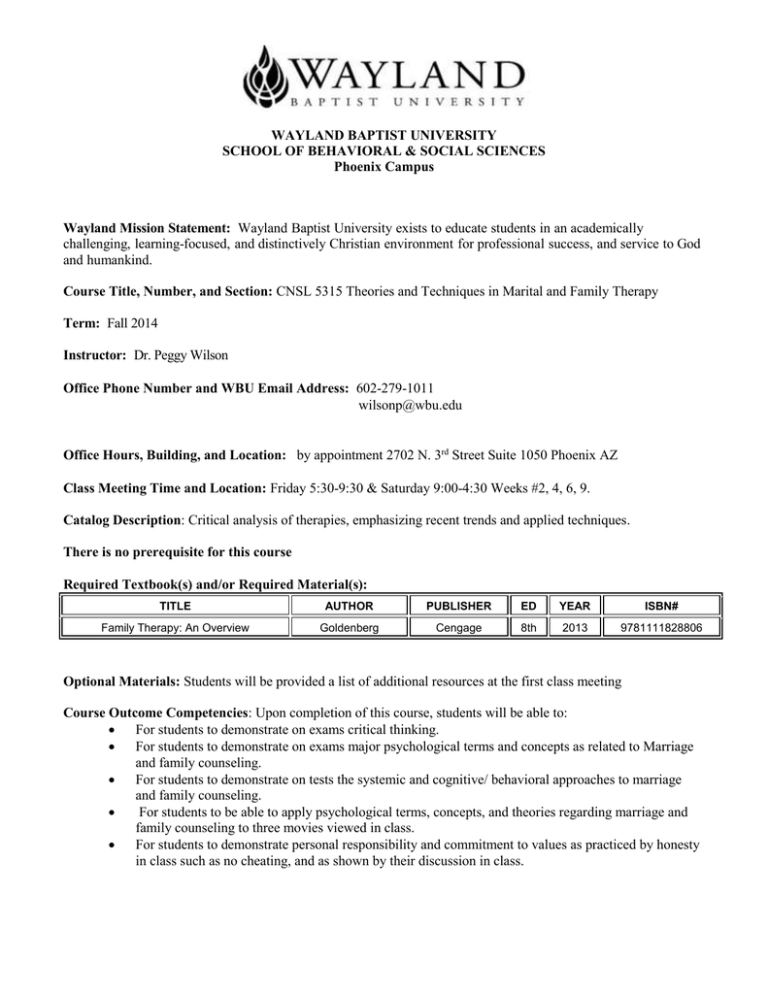
WAYLAND BAPTIST UNIVERSITY SCHOOL OF BEHAVIORAL & SOCIAL SCIENCES Phoenix Campus Wayland Mission Statement: Wayland Baptist University exists to educate students in an academically challenging, learning-focused, and distinctively Christian environment for professional success, and service to God and humankind. Course Title, Number, and Section: CNSL 5315 Theories and Techniques in Marital and Family Therapy Term: Fall 2014 Instructor: Dr. Peggy Wilson Office Phone Number and WBU Email Address: 602-279-1011 wilsonp@wbu.edu Office Hours, Building, and Location: by appointment 2702 N. 3rd Street Suite 1050 Phoenix AZ Class Meeting Time and Location: Friday 5:30-9:30 & Saturday 9:00-4:30 Weeks #2, 4, 6, 9. Catalog Description: Critical analysis of therapies, emphasizing recent trends and applied techniques. There is no prerequisite for this course Required Textbook(s) and/or Required Material(s): TITLE AUTHOR PUBLISHER ED YEAR ISBN# Family Therapy: An Overview Goldenberg Cengage 8th 2013 9781111828806 Optional Materials: Students will be provided a list of additional resources at the first class meeting Course Outcome Competencies: Upon completion of this course, students will be able to: For students to demonstrate on exams critical thinking. For students to demonstrate on exams major psychological terms and concepts as related to Marriage and family counseling. For students to demonstrate on tests the systemic and cognitive/ behavioral approaches to marriage and family counseling. For students to be able to apply psychological terms, concepts, and theories regarding marriage and family counseling to three movies viewed in class. For students to demonstrate personal responsibility and commitment to values as practiced by honesty in class such as no cheating, and as shown by their discussion in class. Attendance Requirements: Students enrolled at one of the university’s external campuses should make every effort to attend all class meetings. All absences must be explained to the instructor, who will then determine whether the omitted work may be made up. When a student reaches that number of absences considered by the instructor to be excessive, the instructor will so advise the student and file an unsatisfactory progress report with the external campus executive director/dean. Any student who misses 25 percent or more of the regularly scheduled class meetings may receive a grade of F in the course. Additional attendance policies for each course, as defined by the instructor in the course syllabus, are considered a part of the university’s attendance policy. A student may petition the Academic Council for exceptions to the above stated policies by filing a written request for an appeal to the executive vice president/provost. Disability Statement: In compliance with the Americans with Disabilities Act of 1990 (ADA), it is the policy of Wayland Baptist University that no otherwise qualified person with a disability be excluded from participation in, be denied the benefits of, or be subject to discrimination under any educational program or activity in the university. The Coordinator of Counseling Services serves as the coordinator of students with a disability and should be contacted concerning accommodation requests at (806) 291- 3765. Documentation of a disability must accompany any request for accommodations. Course Requirements and Grading Criteria: Requirements include assigned readings, case studies, video reviews, and exams. The University has a standard grade scale: A = 90-100, B = 80-89, C = 70-79, D = 60-69, F= below 60, W = Withdrawal, WP = withdrew passing, WF = withdrew failing, I = incomplete. An incomplete may be given within the last two weeks of a long term or within the last two days of a microterm to a student who is passing, but has not completed a term paper, examination, or other required work for reasons beyond the student’s control. A grade of “incomplete” is changed if the work required is completed prior to the last day of the next long (10 to 15 weeks) term, unless the instructor designates an earlier date for completion. If the work is not completed by the appropriate date, the I is converted to an F. Student grade appeals: Students shall have protection through orderly procedures against prejudices or capricious academic evaluation. A student who believes that he or she has not been held to realistic academic standards, just evaluation procedures, or appropriate grading, may appeal the final grade given in the course by using the student grade appeal process described in the Academic Catalog. Appeals may not be made for advanced placement examinations or course bypass examinations. Appeals limited to the final course grade, which may be upheld, raised, or lowered at any stage of the appeal process. Any recommendation to lower a course grade must be submitted through the Executive Vice President/Provost to the Faculty Assembly Grade Appeals Committee for review and approval. The Faculty Assembly Grade Appeals Committee may instruct that the course grade be upheld, raised, or lowered to a more proper evaluation. Tentative Schedule: Course calendar, topics, assignments, and due dates will be emailed to students by the first day of the term.
